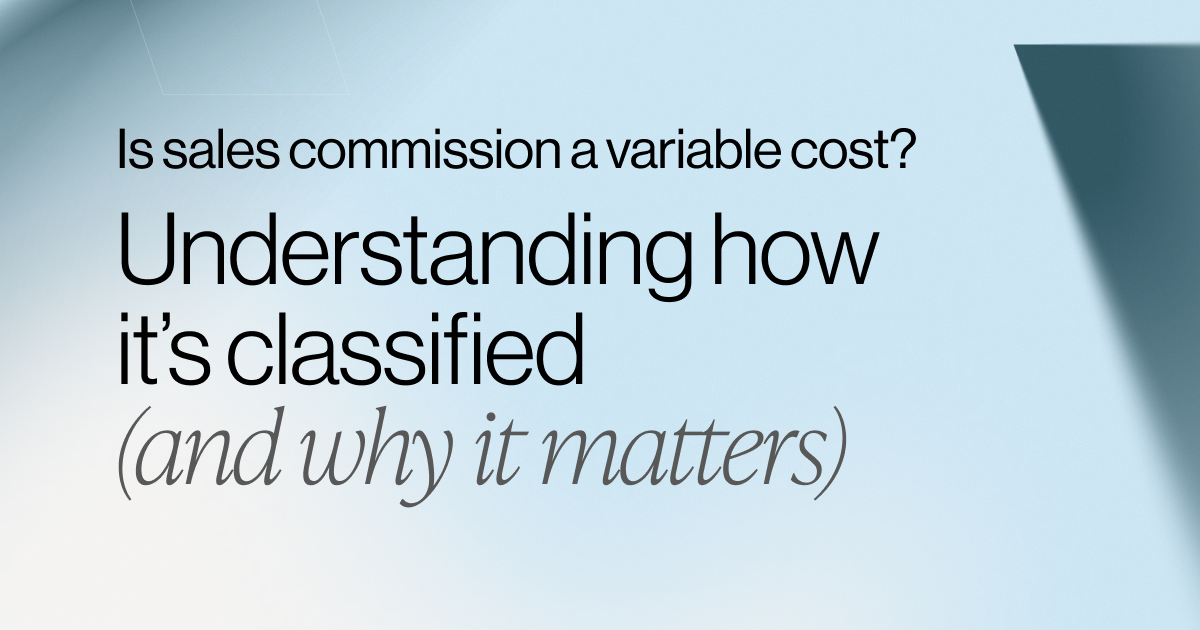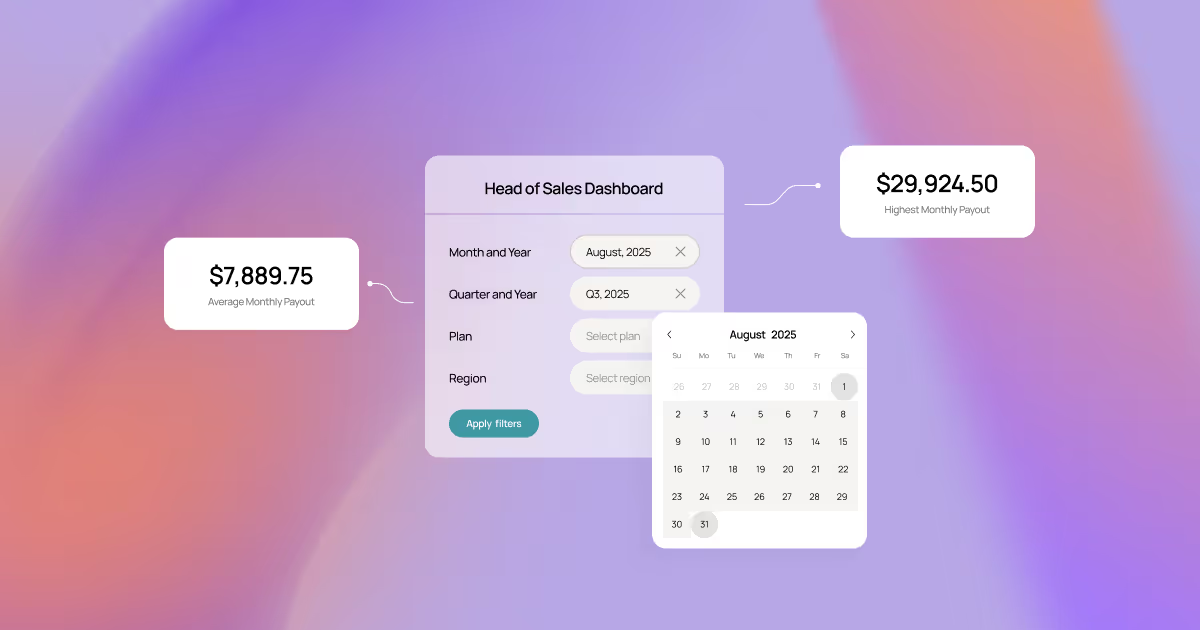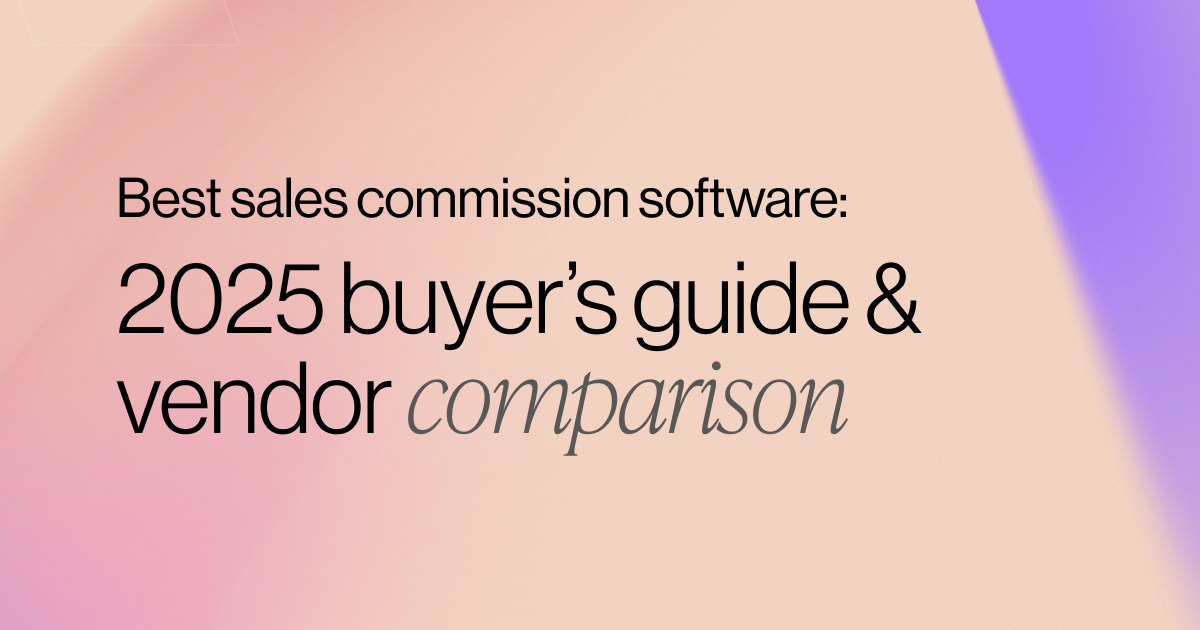Average Sales Commission Rates by Industry in 2025
To attract talented sales professionals to your organization, you’ll need to pay competitive commission rates. An attractive commission structure helps incentivize your sales team to perform to the best of their ability, reach quotas and the on-target earnings (OTE) range, and quickly navigate the sales lifecycle.
It also shows that you value their work — increasing motivation and intrinsic investment in your organization's success.
As Charlie Munger, Billionaire investor in Berkshire Hathaway (of Warren Buffett fame) states:
Never, ever, think about something else when you should be thinking about the power of incentives.
Of course, standard incentive pay and commission rates vary widely between industries. If you're looking for an average commission pay, you really want to first identify the vertical market and sales commission structure. For example, benchmark auto sales commissions are going to widely differ from typical commission rates in SaaS sales.
And if we want to be competitive, it's important to assess current industry standards before setting a commission structure. This helps you understand see where your organization could fit into the current landscape.
Here are key sales commission rates by industry, as well as how these commission rates are determined.
TL;DR: Across industries, most sales commissions fall between 5–20% of the sale value. High-ticket industries (real estate, auto, SaaS) pay on the higher end, while retail and insurance are typically lower.
What Is a Sales Commission Rate?
What is commission and how does commission work?
A commission is a payment that sales representatives receive when they sell a product or service. In most cases, reps receive a set percentage of the sale price as commission. They could also receive a flat commission fee for each sale.
The commission-based pay structure is often the standard for sales organizations — there are more than 2.1 million commissioned sales associates in the United States alone.
Most commission pay structures are paid on top of a base salary as extra managed incentive compensation. However, there are some roles that are commission-only.
For example, real estate agents and auto sales reps work entirely on commission due to the high sales prices of their products. An insurance agent salary might also be heavily focused on additional incentive.
A commission structure is very popular for sales professionals because it ties pay directly to sales performance. Getting paid for each sale can help sales reps stay motivated and incentivize them to try new strategies.
How Are Sales Commission Rates Determined?
Every organization calculates its sales commission rates differently. Commission rates can even vary between individual salespeople at the same company.
The industry you work in will influence your sales commission rates drastically. However, it’s not the only factor that goes into building a commission structure. Other important factors to consider include:
- Organization size: A larger organization might have more financial resources available to pay commissions than a small startup.
- Location: Standard commission rates can vary between cities and countries based on the current cost of living. This is particularly true for industries like real estate, where work is very location-specific. For example, California has an average real estate commission rate of 11%, while Virginia has an average rate of 6.67%. This is because property values are much higher in California, so agents can still make a good living with a lower commission rate.
- Current economy: During tough economic times, companies may not have the cash flow to pay high commission rates.
- Product type and sales cycle: Different products have different sales cycle lengths, and this can affect commission rates and structures. For example, a product with a long sales cycle requires your reps to maintain ongoing relationships with their prospects, which can justify a higher commission rate per sale.
- Sales experience level: A sales rep with decades of experience will likely command a higher rate than someone who is brand new to the role.
Executives should carefully consider these factors when setting commission rates. The right commission rate for your organization should entice talented sales professionals, but also fit realistically into your budget.
What are the Types of Sales Commission Structures?
Sales commission structures are a part of variable pay that help us determine how to pay sales reps, along with the regulations around sales compensation.
The sales commission structure will include details about:
- Commission rate and terms of commission pay.
- Payment deadlines.
- Qualifications for incentive commissions.
This ensures that the team and sellers are aware of the parameters around the commission payment. The most common sales commission structures are:
- Straight Commission: 100% of earnings come from sales, with no baseline salary.
- Base salary plus commission: Reps earn additional compensation along with their standard salary based on fixed commission rates or direct sales.
- Tiered Commission: Sellers have a set commission percentage on sales and reach incremental goals to increase the amount they can earn.
Now, let's see how these sales commission structures and others unfold in various industries.
What is are the Average Sales Commission Rates by Industry?
Commission standards vary widely by industry — a lucrative commission rate in one industry could be considered inadequate in another. This is because customer expectations, sales cycles, company budgets, and product pricing differ between industries. Here’s a look at the average sales commission rates and structures across a range of industries.
Technology Commission Rates
Commission rates for technology and SaaS salespeople typically start around 10%. However, it’s possible to see commission rates as low as 5% or as high as 20% in this industry. To qualify for commission, reps usually need to hit pre-defined sales targets or sales quotas each quarter. It’s also common for tech sales representatives to receive a competitive base salary in addition to commission.
B2B software contracts often last for one to three years. Salespeople in this industry usually receive commission on the total amount of the contract. If a sales rep closed a $300,000 contract with a 10% commission rate, they’d receive a total of $30,000 in commission for that sale. Many companies also offer a smaller renewal bonus when clients re-sign their contracts or upgrade to a more expensive plan.
Real Estate Commission Rates
The average commission rate for a residential real estate agent is 5 to 6% of the home’s sale price. Commission rates for commercial real estate agents are slightly more variable, averaging 4 to 8%. Real estate commission rates tend to get lower as the value of the deal gets higher.
Either the seller or the buyer could pay the commission fee, or both parties could split it. This is negotiated and agreed upon before the deal closes. Most real estate agents work entirely on commission rather than receiving a salary. The exception to this is real estate agents who work for a major brokerage and may receive a salary.
In some locations, realtors can also earn commission by facilitating rental contracts. In this instance, the landlord pays the realtor the commission fee rather than the renter. Rental commission fees and structures vary by city and by property type. In some cases, the realtor will receive a percentage of the total yearly rent for the property. In others, the realtor will get a flat fee for each lease.
Insurance Commission Rates
Sales roles for auto, home, and life insurance are very commission-driven. Insurance agents fall into one of two categories: captive or independent. This affects their commission rates and structure.
Captive insurance agents work with just one insurance company. They typically receive 5 to 10% of the first year’s premiums for each insurance policy they sell. Captive insurance agents usually receive a base salary as well.
Independent insurance agents work with many different insurance providers. They receive higher commission rates averaging around 15%. Independent insurance agents don’t always receive a base salary and may live entirely off commissions.
Some insurance agents receive their entire commission up front, while others receive residual commissions over the lifespan of the policies they sell. Insurance agents may also receive bonus commissions for things like selling policy add-ons, policy renewals, or hitting pre-defined quotas.
Finance Commission Rates
Financial advisors often make commissions when selling investment products like mutual funds and annuities. Commission rates for financial sales vary between products, but they tend to be lower than in other industries.
For example, the average commission rate for mutual funds is just 0.25 to 1% of the amount the customer invests. Rates for annuities and other investment products are slightly higher, with rates anywhere from 1 to 10%.
Financial advisors almost always receive a competitive base salary in addition to commissions. This has benefits for both the salesperson and the client. With this approach, financial advisors have the security of a regular paycheck. It also reduces the incentive to push financial products that don’t fit the client’s budget or risk tolerance.
Auto Commission Rates
Most auto sales representatives work entirely on commission and do not receive a base salary. However, auto commission rates tend to be higher than rates in other industries. Auto dealers usually offer approximately 20 to 30% of the car’s sale price as commission.
Some dealerships provide one commission payment upfront. Others split commission into multiple payments for the initial sale and for financing. As in many other industries, auto sales reps often receive bonuses for meeting quotas or selling auto add-ons.
Pharmaceutical Commission Rates
Pharmaceutical sales reps sell medications and medical devices to healthcare providers in their sales region. They typically sell these products in bulk to doctors or hospitals. The average yearly commission rate for a pharmaceutical rep is $44,798, although percentage rates vary widely. Pharmaceutical reps typically earn more than a third of their income from commissions.
This role can be very demanding and often involves traveling. Pharmaceutical sales reps are often paid a very lucrative base salary in addition to their commissions.
Travel Commission Rates
Travel agents receive commissions for booking hotels, transportation, and guided tours for their clients. On average, travel agents receive 1 to 20% of the total sale price in commission rates. They may also receive flat fees for each booking.
Some travel providers use a tiered commission structure, which incentivizes agents to make large group bookings and remain loyal to that provider. For example, they might receive a 5% commission rate for standard hotel bookings but a 7% commission rate for booking groups of 20 or more.
Some travel agents receive base salaries, while others work only on commission — it all depends on the structure of the travel agency. Many travel agents supplement their income from bookings by selling personalized travel consultations and itineraries.
Retail Commission Rates
Retail sales professionals who sell high-ticket items, such as electronics or designer clothing, often receive commission on top of their hourly rate. Retail commission rates are approximately 15% (in apparel) but can vary widely depending on the specific products sold. In many cases, you’ll need to meet sales quotas in order to qualify for commission.
Find the Right Commission Structure for Your Industry
When building your organization’s commission structure, it’s important to understand current practices and standards for your industry. This will help you set competitive commission rates and attract a talented sales team.
No matter what industry you’re in, CaptivateIQ makes calculating commission rates simple and straightforward. With CaptivateIQ’s data and AI-powered insights, you can optimize your commission structure to incentivize better sales performance.
Book a meeting today to get started and learn more.
Sales Commission Rates Frequently Asked Questions (FAQs)
What are Typical Sales Commission Rates?
Typical sales commission rates range from 5% to 20%, depending on the industry, sales cycle length, and deal size. In industries with high-volume, transactional sales (like retail or insurance), commission rates tend to be on the lower end. In contrast, enterprise software or professional services — where deals are larger and cycles are longer — may offer higher rates or include accelerators and bonuses.
What Industry Pays the Highest Commission?
Industries like enterprise software, financial services, and medical device sales typically offer the highest commission potential. These roles often involve longer sales cycles, complex deals, and significant revenue per contract, which justifies commission rates in the 10–20% range or higher when accelerators kick in.
What is a Good Sales Incentive Percentage?
A good sales incentive percentage falls between 20% and 40% of a rep’s total compensation, though this can vary by role, industry, and sales strategy. For example:
- Entry-level SDRs might see 10–20% variable pay
- Quota-carrying AEs often earn 40–50% of their comp from incentives
- High-performing enterprise reps may earn even more through accelerators and bonuses
What is a Good Commission Rate for Sales?
A good commission rate usually falls between 5% and 20% of the sale value, depending on industry and deal size. High-ticket industries like SaaS, auto, or real estate often pay toward the higher end.
Is 20% Commission Normal?
Yes, 20% commission is common in industries with high-margin or high-ticket sales, such as auto sales, luxury goods, or enterprise software. In lower-margin sectors like retail, commission rates are typically 5–10%.
What is the Commission for B2B Sales?
B2B sales commissions typically range from 5–15% of deal value, with SaaS and enterprise contracts often including accelerators that raise payouts above 15% once quotas are exceeded.
What are the Three Types of Commissions?
The three most common commission structures are:
- Straight commission – 100% of pay is based on sales.
- Base salary + commission – a mix of fixed salary and variable pay.
- Tiered commission – higher rates as sales targets are surpassed.
.svg)








